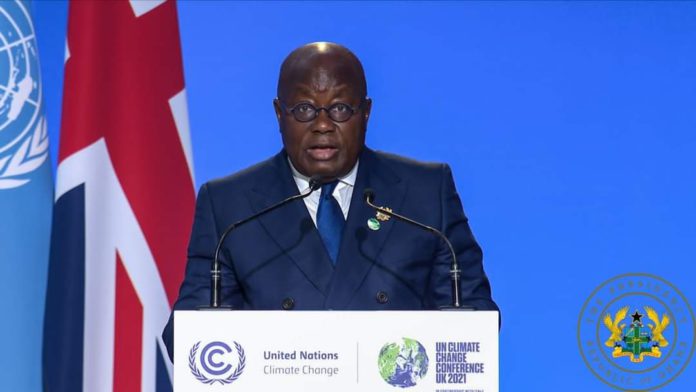Climate change is the greatest threat to the realisation of Sustainable Development Goals. It has an enormous impact on the fundamentals required for our survival on earth, which is why we have converged in Glasgow.
Even though we, in Africa, are the least of the contributors to this phenomenon, responsible for less than 4% of the global volume of carbon emissions, we suffer the most because our agrarian and resource-driven economies are peculiarly susceptible to the effects of climate change, and our capacity to withstand its shocks is weak.
Agriculture, water, energy, and the extraction of mineral resources are essential drivers of developments in our countries but, at the same time, are characteristically sensitive to changing climate.
The African Development Bank has stated that the continent will need some $3 trillion “in mitigation and adaptation by 2030” to enable us to implement our nationally determined contributions. The obvious question arises as to how do we, in Africa, finance these commitments, especially as our socio-economic development continues, unfortunately, to be low.
The Almighty has blessed our lands with abundant natural resources, and it would be wholly unfair for the world to demand that Africa abandons the exploitation of these same resources needed to finance its development and help us to cope better with the threat of climate change at a time when many countries on the continent have only just discovered them.
The development and industrialisation of today’s wealthy nations were also hinged on the exploitation of their natural resources. This development came at the expense of pollution and the emission of greenhouse gases. Even today, the western world is responsible for 76% of carbon emissions.
Ghana acknowledges the importance and effects of Climate Change and the urgent need to combat it, and we acknowledge equally the importance of protecting our development. However, we believe that a balance must be struck and maintained between our social, economic and environmental imperatives.
We are, naturally, very disappointed by the failure of the wealthy nations to honour their commitments of making available $100 billion annually to the poorer countries to assist us in the fight against climate change and by the unavailability of the technology transfer that will help us find sustainable ways of charting a path out of this existential crisis.
However, those same nations are insisting that we abandon the opportunity for rapid development of our economies. That would be tantamount to enshrining inequality of the highest order, a totally unacceptable conclusion.
We must find an equitable and fair solution, a solution that levels the playing field, a solution that recognises the historical imbalances between the high emitters and low emitters. Ghana, therefore, supports the call for debt-for-climate swaps, which will address a multitude of issues in one fell swoop.
Let us use this Summit as a turning point to create a more prosperous, greener and fairer world, which maintains the balance between the social, economic and environmental requirements of all nations of the earth, rich and poor.
Success, in this endeavour, is the most significant inheritance we can leave for current and future generations.
I thank you for your attention.

